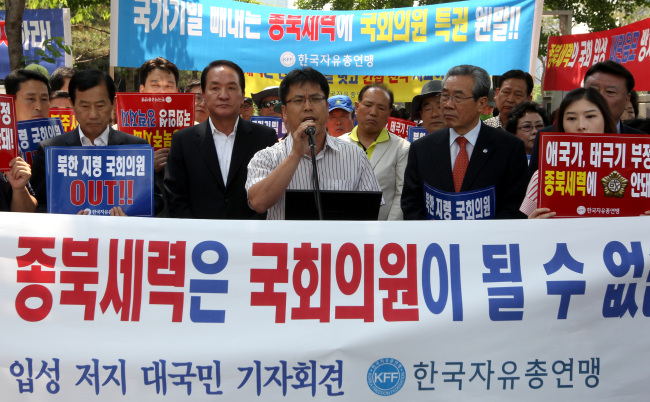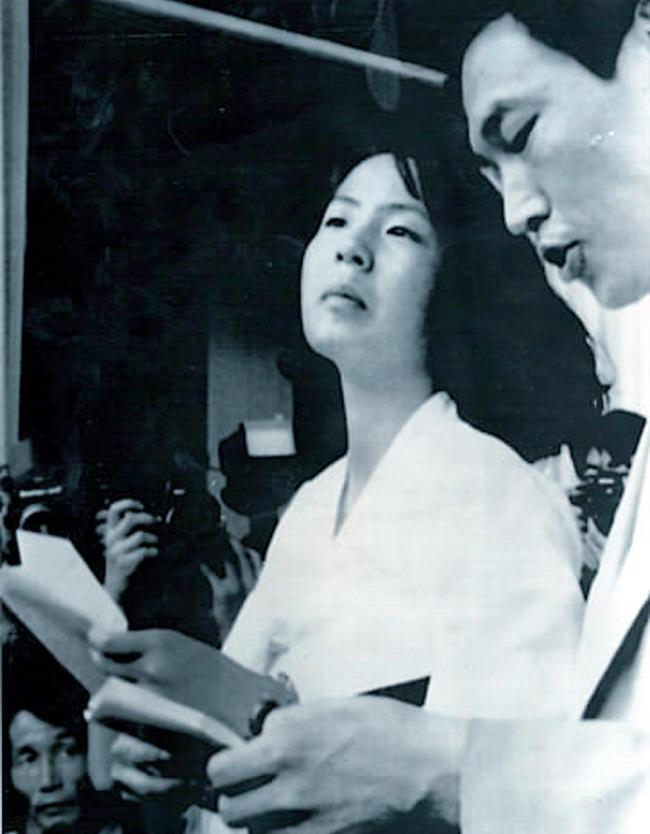
Dispute continues over accepting N.K. sympathizers as Assembly members
On June 30, 1989, a South Korean college student, frail but oozing with confidence, turned the Korean Peninsula upside down as she touched down at Sunan International Airport in Pyongyang, leaving a blindsided Seoul government aghast.
The 21-year-old Lim Soo-kyung was there to attend the 13th World Festival of Youth and Students as the representative of “Jeondaehyup,” a major association of radical student activists formed in 1987.
On June 30, 1989, a South Korean college student, frail but oozing with confidence, turned the Korean Peninsula upside down as she touched down at Sunan International Airport in Pyongyang, leaving a blindsided Seoul government aghast.
The 21-year-old Lim Soo-kyung was there to attend the 13th World Festival of Youth and Students as the representative of “Jeondaehyup,” a major association of radical student activists formed in 1987.

At the peak of her 47-day stay, the Hankuk University of Foreign Studies student was warmly embraced by “Great Leader” Kim Il-sung as tens of thousands of North Koreans gazed with curiosity and appreciative fondness.
On her way back across the Demilitarized Zone, North Koreans wished her well. They worried about what the Seoul authorities would do to her and hoped she would become the messenger of the regime built on Kim’s “Juche” ideology, North Korean defectors recall.
Fast forward 23 years and Lim, now a lawmaker for the main opposition Democratic United Party, is again at the center of a dispute in the South. This time the controversy surrounds a group of new legislators accused of past pro-North Korea activities.
Conservatives still call them “Jusapa,” a term used to describe student activists in the 1980s and ’90s who upheld the “Juche” ideology, the theoretical foundation of North Korea.
“I apologize to all who were hurt by my inappropriate remarks,” Lim, 43, said at a press conference on June 4 after it was reported that she had insulted North Korean defectors by calling them “traitors.”
The gaffe came as some Unified Progressive Party lawmakers, including Lee Seog-gi and Kim Jae-yeon, faced calls to resign over a vote-rigging scandal in the party. Conservatives dug up their records of pro-Pyongyang activities and raised concerns that the legislators’ access to classified information could threaten national security.
The incidents are stirring a deep-rooted social dispute over freedom of thought and the accompanying ideological uproar in South Korea, a relatively young democracy still threatened by the communist North.
“We are witnessing the side effects of erroneous belief that persevered even after the establishment of democracy,” said Dr. Park Sang-hoon, representative of publishing house Humanitas.
Political parties have jumped into the fray, sidelining other crucial issues, such as welfare and economic democratization.
The ruling Saenuri Party did not miss a beat to call for the ouster of the so-called pro-North lawmakers, some even suggesting a need to verify each legislator’s ideological standing. The DUP and the UPP have accused the ruling party of pursuing McCarthyism for the sake of the December presidential race.
All the while, the names “chinbuk” (pro-North), “jongbuk” (pursuant to North) and “Jusapa” are thrown about, with none of the parties offering to clarify what means what or who is who.
“All the (alleged) identities are uncertain. Discussion by any party will be viable only when the identities can actually be ascertained,” said Seoul National University sociology professor Song Ho-keun.
Defining Jusapa
According to a former Jusapa activist, the word jongbuk has not been used until recently to describe those who favor the Juche ideology.
“The word jongbuk most recently came to the fore in 2006 when the lawmakers such as Roh Hoe-chan bolted from the Democratic Labor Party upon the Ilsimhoe case (in which some DLP members were accused of handing over confidential information to the North). The right-wingers took the liberty of using the word since then to define the forces,” Lee Jong-cheol told The Korea Herald.
Lee, president of the Korea University student council in 1996, was a Jusapa factionist until 1999, when he converted after two years in prison. He was jailed for violating the National Security Law for distributing materials aiding the enemy.
Although the mainstream Jusapa activities prevailed in the 1980s, Lee said university students post-1980s were still exposed to the philosophy.
“First of all, when you enter university, there are almost monthly ceremonies to commemorate various democracy uprisings and movements. Students start to research and openly discuss them, which leads to one becoming critical of the foundation upon which the South was built, and how the Syngman Rhee administration was the ‘puppet’ of the U.S. imperialism after having acquired his authority by physically oppressing the wishes of the people,” Lee explained. Syngman Rhee was the first president of South Korea, in office from 1948 to 1960.
“On the other hand, we come to learn that Kim Il-sung came to build the North based on the Juche idealism that was keenly received by the people,” Lee said.
The Juche (meaning “self-owned” or “main body”) idea, the original political theory of the Kim Il-sung regime, teaches that man is the center of everything and thus decides everything and one’s fate. It became more elaborate since 1955, resulting in a set of principles to define the North Korean leadership and their policies.
“As you learn more about this idea, it leads to one appreciating how (Kim Il-sung) enabled the idea to acquire its political existence, which eventually leads to one following the Juche principles, overshadowing the actual philosophy,” Lee said, who is now a representative of the youth forum Story K.
In the 1980s, the student movement diverged into two factions called NL (National Liberation) and PD (People’s Democracy). Jusapa was a pro-North Korean element of the NL, and its most powerful sub-group.
Aside from these two factions, there were those who joined the democratic movement in simple opposition to the military-backed governments.
The NL believed various problems in South Korean society derived from the division of Korea due to the influence of an external force: the United States. They believed the U.S. must withdraw to allow the two Koreas to reunify. Former NL activists still call for the withdrawal of the U.S. Forces Korea and are the most fierce opponents of the Korea-U.S. Free Trade Agreement.
The PD faction emphasized Marxism-Leninism. It focused on class conflict and sought to overthrow the dictatorship through a popular revolution. It is not necessarily pro-North or anti-U.S., instead concentrating on subverting the capitalist system and promoting the interests of the proletariat.
The pro-North Korea NL group was led by Seoul National University law student Kim Young-hwan, who indoctrinated student activists with a series of papers upholding Juche thought and the North’s personality cult.
After student groups were rounded up, Kim established Minhyukdang, or the “People’s Democratic Revolutionary Party,” in 1992, after he met Kim Il-sung in Pyongyang in 1991.
After the North Korean founder’s death in 1994, Kim and many colleagues were disenchanted with the North’s totalitarian regime and dissolved the underground party. He has since campaigned against human rights abuses in the North. Kim has been held in China for unspecified reasons since March.
The existence of the party came to light in 1999, when the South Korean intelligence agency arrested a group of Kim’s former co-workers who refused to convert and attempted to rebuild the Minhyukdang. One of them was Ha Young-ok, who conservative media pinpoint as the mentor of the current “pro-North Korea” members of the UPP. Rep. Lee Seog-gi of the UPP was arrested in 2002 on the same charges.
In a contribution to the May 1999 issue of then-flagship progressive magazine “Monthly Mal,” former UPP co-chairman Rhyu Si-min explained his view on what incited Jusapa. The former activist was not a member.
“In retrospect, there were two factors that brought out my ‘pro-North tendency’,” Rhyu wrote after commenting that he avoided accepting Juche as his philosophy despite its attractions.
“First was the inferiority complex with regard to the authenticity of our system,” he wrote, citing how the North vigorously purged pro-Japanese forces, while a “pro-Japanese” figure seized power in the South. The second, he wrote, came from the dismay of seeing military-led suppression despite the human rights protection and democracy espoused by the U.S. government.
The South went through decades of authoritarian rule until the 1987 democratization movement that led to the revival of direct presidential elections.
“The 386-generation spent their adolescence in an unfortunate political and social environment in which even those with completely normal values and ways of thinking could become a Jusapa,” Rhyu wrote. The term 386 refers to those who were born in the 1960s, were university students in the 1980s and were in their 30s in the 1990s.
Lee Jong-cheol, who said he switched beliefs after seeing the destitution suffered by North Koreans, added that this generation now thinks differently.
“As the world turned into the democratic system and the 386-generation came to participate in politics, I believe they have also come to change their ways of thinking,” he said.
“The problem could be they are yet to discard their old habit of fighting against the ‘conservatives’ whenever a social issue breaks out, which ends up placing them closer to what is viewed as ‘Jongbuk.’”
How far is free?
The political parties remain at loggerheads over lawmakers with what the ruling party calls questionable backgrounds.
“In the case of the UPP, it must be clear that the issue of vote rigging and their personal beliefs are two different problems. The vote-rigging matter falls under the jurisdiction of the National Election Commission, while their questionable beliefs are a matter that concerns their vows before the people to serve for their well-being,” the Saenuri Party’s Rep. Hwang Ji-ha told The Korea Herald.
Hwang, along with six other lawmakers, called for an ouster of pro-North lawmakers on June 5.
Former student activist and DUP member Rep. Woo Sang-ho expressed outrage over what he calls an attempt to color the opposition party.
“It is simply outrageous to bring back the ideological struggle of the 1980s when they are clueless about what the past activists were about,” Woo told The Korea Herald.
“It is obsolete politics to invoke an ideological debate in time for every election,” he said, adding what some believed in the past had ceased to be relevant when democracy was introduced.
Lee Jong-cheol, meanwhile, suggested the scope of “freedom of thought” could be determined by whether someone could openly hold any position on controversial subjects such as North Korea.
The UPP is setting up a special committee to revamp its image, which has been tainted by a series of controversies, including a dispute over one of its lawmakers-elect’s refusal to clarify his position on North Korea’s hereditary rule during a televised debate.
The question over how far someone’s ideology could be tolerated or protected in a country technically at war looks likely to persist, observers said.
“There appears to be two legal frames that define the fundamentals of ethics that those in public posts are expected to abide by: the Constitution and the National Security Law,” Park of Humanitas said.
The National Security Law was enacted prior to the Criminal Law in December 1948, when the Constitution was barely established upon liberation from Japan’s colonial rule. NSL violations are specific actions that benefit the enemy, such as collecting, spying and leaking state secrets, or praising the enemy at the risk of damaging the stability of the state. Debate continues over the law. Progressives demand its abolition for the sake of freedom of speech, while conservatives say national security still needs it in place.
By Lee Joo-hee (jhl@heraldcorp.com)
-
Articles by Korea Herald



















![[Today’s K-pop] Treasure to publish magazine for debut anniversary](http://res.heraldm.com/phpwas/restmb_idxmake.php?idx=642&simg=/content/image/2024/07/26/20240726050551_0.jpg&u=)